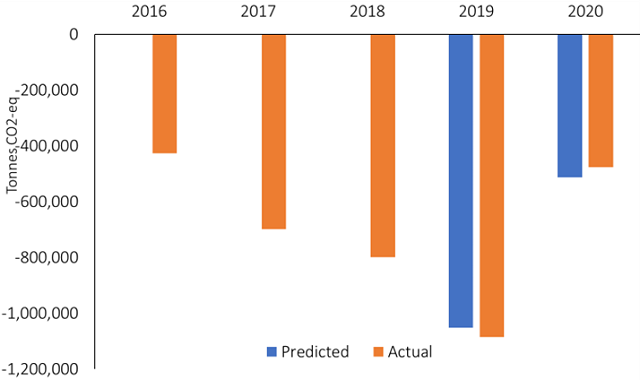We were delighted to see Defra publish the experimental statistics on carbon impacts of household waste between 2016 and 2020. We examined the dataset in detail and were pleased to observe the average trend of decreasing carbon impacts over time, excluding the anomalous year of 2020, when the majority of adverse COVID impacts on waste services occurred.
As part of inhouse research and development, we have been working on machine learning models to aid our numerical modelling work to empower our clients with greater insights into their data and found the release of the Defra carbon statistics to be an excellent opportunity to test some of our work.
As such, we set out to implement a machine learning model, whereby important and relevant features of a large dataset can be given to the model upon which it is then trained so that predictions can be made in the future. We used the Defra dataset (2016 to 2018) by year, stream and tonnage sent for type of treatment/disposal to train our model to predict the overall annual carbon impacts of waste management. We then used the model to predict the total carbon impacts of the years 2019 and 2020.
The results are shown below. As it can be seen, the model trains well and predicts the carbon impacts within 10% accuracy by providing it only the stream type, tonnage and route of treatment and/or disposal – the recycling data is not included . Once the model is trained, it requires only a fraction of the time to calculate the total national carbon impacts per year, instead of having to work out totals from the ground up (time-consuming, especially for large datasets). Similarly, once the model parameters are fine-tuned, large datasets from our clients can be used to calculate and measure carbon impacts of waste management services to help inform decision-making to meet their net-zero targets, which would be in-line with current government thinking.

Figure 1 - Annual Actual vs Predicted Carbon Impacts of Household Waste Management

This blog provides an example of, and highlights the potential of, utilizing state-of-the-art data analytics and machine learning tools in waste and carbon management to gain further insights and make faster decisions based on metrics derived at a greater ‘resolution’ from the available data.
Frith Resource Management provide technical advice to Councils on waste strategy, options appraisals, public consultation, carbon modelling, service governance and procurement. See www.frithrm.com or call 01746 552423 or email paul@frithrm.com













